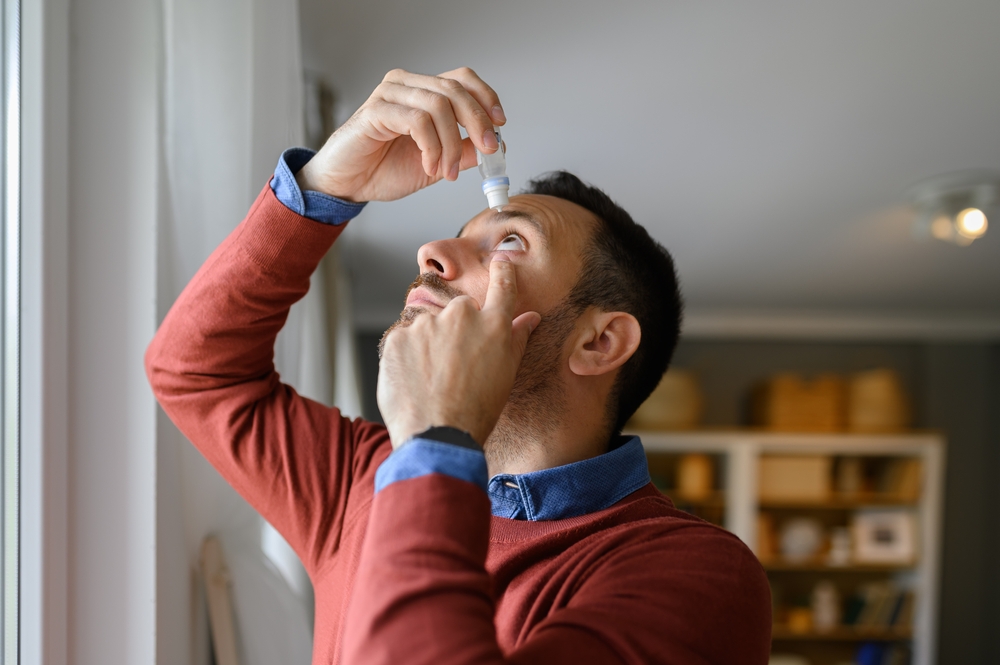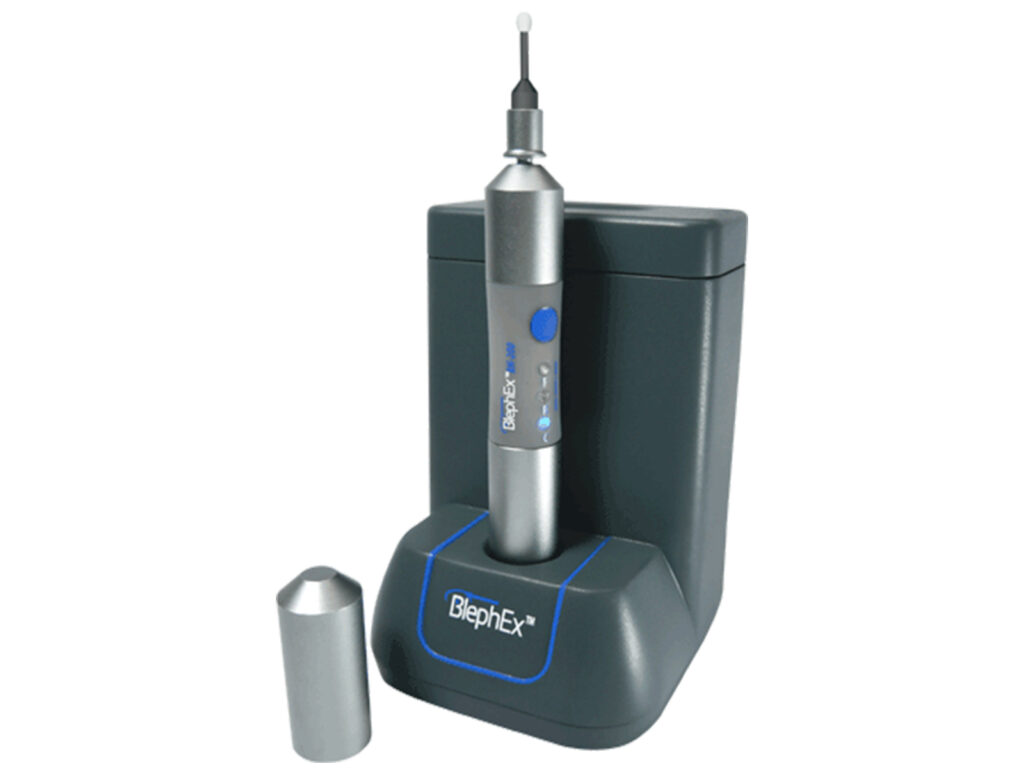Allergies of all kinds can be incredibly frustrating. However, allergy symptoms that affect your eyes can be especially bothersome.
Allergy symptoms affecting the eyes are also prevalent since tree pollen is one of the most common allergies. Tree pollen is abundant in the air during the spring and summer.
If you have a pollen allergy, you know that allergy season can be miserable, especially when you have to be outdoors. Unfortunately, standard allergy medications sometimes won’t give you the relief you need.
That’s where another common eye condition comes in: dry eye syndrome. If your eyes frequently feel too dry and not getting the moisture they need, it only makes your allergy symptoms even worse.
Allergic conjunctivitis and dry eyes are a terrible combination. But dry eye treatment can make a difference. Keep reading to learn how you can stop eye irritation in its tracks with dry eye treatment and get the relief you need from your allergies this season!
What is Allergic Conjunctivitis?

Allergic conjunctivitis is the medical term for allergy symptoms that affect your eyes. Specifically, it refers to the inflammation of the conjunctiva, which is the lining of the eye and inside of the eyelids.
Airborne allergens like dander, dust, and pollen trigger allergic conjunctivitis. Allergic conjunctivitis symptoms include:
- Itchy eyes
- Swollen eyelids
- Red eyes
- Watery eyes
- Mucus build-up around your eyes
The most apparent symptom most people have from allergic conjunctivitis is itchy eyes. It can be tempting to rub your eyes when they itch, but rubbing them irritates and makes them more itchy.
It can also cause damage to your eyes and cause more harm than good.
What is Dry Eye Syndrome?
Dry eye syndrome is a chronic condition that occurs when the tear film in the eye becomes inadequate. The tear film is the tears that coat the outside of the eye and are distributed over the eye each time you blink.
When the tear film cannot properly moisturize and lubricate the eye, it becomes dry. This is usually caused by an imbalance in the tear composition.
Tears have three layers: the inner layer is mucus, the middle layer is water, and the outer protective layer is oil. When your eyes don’t produce enough of one of these components, your tear quality suffers, and your eyes become dry. Symptoms of dry eye syndrome include:
- Burning
- Stinging
- Feeling like there’s grit in the eye
- Red eyes
- Watering
- Mucus build-up
- Inability to wear contact lenses
- Light sensitivity
Your eyes may also feel a little itchy, although this is not as common a symptom as it is for allergic conjunctivitis. With dry eyes, you’re more likely to be tempted to rub your eyes just because they feel gritty, or it may feel like there’s something in your eye when there’s nothing there.
Is it Allergies or Dry Eye?

Allergy symptoms and dry eye symptoms are similar, but they’re also distinct. If your eyes primarily feel itchy, you likely have allergic conjunctivitis.
If your eyes are burning, stinging, and like they have grit in them, you likely have dry eyes. However, it’s common to have both dry eyes and allergic conjunctivitis at the same time.
If your eyes feel itchy, irritated, burning, and like they have grit in them, you likely have allergic conjunctivitis and dry eyes. But the only way to know what’s causing your eye irritation is to see your ophthalmologist at Dell Laser Consultants.
Seeing your eye doctor is essential not only to relieve uncomfortable symptoms but also because dry eyes can have a lasting effect on the health of your eyes. Left untreated, dry eye syndrome can cause infections and corneal ulcers, leading to potential vision loss.
Diagnosis and Treatment
Your ophthalmologist can diagnose you with dry eye syndrome by taking a sample of your tears and analyzing it. Once diagnosed, they can then recommend and administer treatment. At Dell Laser Consultants, there are a few different treatments we may recommend or offer, including:
Lifestyle Changes and Over-the-Counter Treatments
Some things you can do on your own to help ease your dry eye symptoms. These may include using over-the-counter artificial tears and eyelid wipes, changing your diet to get more nutrients that promote healthy tears, or taking nutritional supplements that contain omega-3 fatty acids.
Sometimes, these simple remedies can significantly ease your symptoms. However, if you have dry eye syndrome, making small lifestyle changes may not be enough to bring you the relief you’re looking for. Many patients with dry eye syndrome require further treatment to see necessary improvements.
Prescription Medications
Several prescription medications can help with dry eyes. These medications are usually eye drops that treat inflammation and promote better tear production. Our doctors may recommend starting prescription eye drops like Cequa, Xiidra, or Restasis to help reduce inflammation and increase your eye’s natural ability to produce tears.

In-Office Therapies
There are several non-invasive in-office therapies you can have that treat dry eye syndrome. TearCare is a treatment that uses gentle heat to soften blocked oil glands in your eyes.
BlephEx is a medical-grade sponge we can use to clean your eyelids more thoroughly than standard eyelid scrubs and wipes, significantly easing any eyelid inflammation.
IPL
IPL uses pulses of light energy targeted to reduce inflammation in the blood vessels and glands around the eyes, especially the meibomian glands, which produce the oily layer of the tear film. By reducing inflammation, IPL helps improve the function of the meibomian glands while also reducing the presence of bacteria and Demodex mites on the eyelids, which can be a factor in dry eye symptoms.
Punctal Plugs
Your punctae are tear ducts, and blocking them off with very tiny plugs prevents your tears from draining from your eye as quickly. By being forced to stay on the surface of your eye longer, your eye gets more moisture, compensating for poor tear quality.
Treating dry eyes can ease dry eye symptoms and allergy symptoms. When your eyes are no longer as dry and irritated, they won’t worsen your allergies, so you can get more relief for your eye allergies with simple over-the-counter allergy medication!
Are you ready to feel better this allergy season? Take the first step by requesting your appointment at Dell Laser Consultants in Austin, TX! Don’t let allergies and dry eyes get you down anymore!





